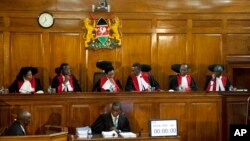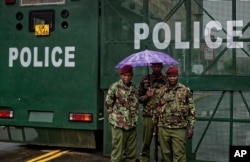Kenya’s Supreme Court is in its last day of hearing arguments on two petitions contesting results of the October 26 presidential election. Incumbent President Uhuru Kenyatta was declared winner by a landslide after challenger Raila Odinga urged his supporters to boycott the poll, which was a re-run of the August election the court declared invalid.
The two petitions were filed by a former lawmaker, Harun Mwau, and two human rights defenders, Njonjo Mue and Khalef Khalifa. The petitioners argued the electoral commission committed illegalities by going ahead with the election in spite of opposition leader Raila Odinga pulling out of the race.
Benjamin Musyoki, who represents Mwau, argues the Independent Electoral and Boundaries Commission was supposed to carry out a new nomination process after the annulment of the original August 8 poll.
“When elections are annulled under article 140, none of the previous candidates, none of the previous processes is safe. All processes are done away with, and actually, in your order, you said that election was null and void. So it is like it did not exist.”
Mwau also argued the election should be revoked based on the violence witnessed in parts of the country and low voter turnout.
The human rights defenders, Mue and Khalifa, argued the electoral commission did not conduct the presidential election in all 290 constituencies as required by the constitution.
The commission failed to deliver voting materials to some opposition strongholds in the west of the country, due to violent protests.
But Attorney General Githu Muigai said this should not be a reason to annul the election.
“What was the legal effect of the failure to hold an election in 25 constituencies? What was the legal effect, if any? None, simple answer - none. Why? Because this constitution does not require majorities based on constituencies, it requires majorities based on counties,” Muigai said.
The petitioners insist the October 26 poll must not stand. But Kenyatta lawyer Fred Ngatia argues the court should put the country's interests first after months of political uncertainty.
“The common good is that which is to the benefit of the entire nation. The common good in my submission would be to uphold the constitutional order so that we do not slide into darkness. Absent a constitutional order the chances of sliding into darkness are very high,” Ngatia said.
The Supreme Court is expected to rule Monday on whether Kenyatta's win will stand or be annulled again.
Whatever the outcome, the opposition has said that it will not recognize the Kenyatta presidency and that it will continue its struggle for electoral justice.





